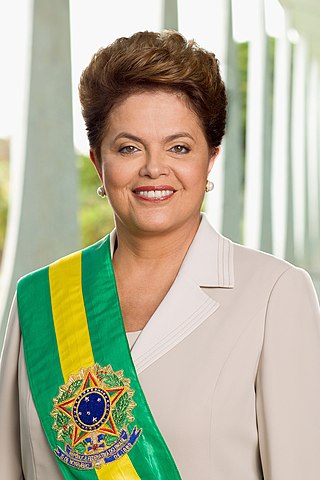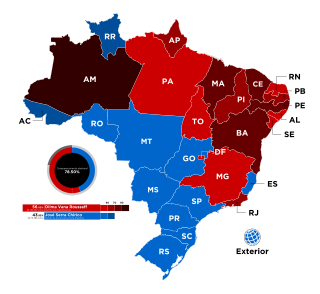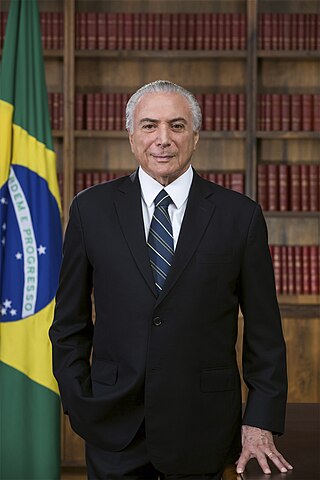Related Research Articles

2016 (MMXVI) was a leap year starting on Friday of the Gregorian calendar, the 2016th year of the Common Era (CE) and Anno Domini (AD) designations, the 16th year of the 3rd millennium and the 21st century, and the 7th year of the 2010s decade.

The Brazilian Democratic Movement is a Brazilian political party. It is considered a "big tent party" and it is one of the parties with the greatest representation throughout the national territory, with the most numbers of senators, mayors and city councillors, always having formed a large part of the National Congress since 1988, and also has the largest number of affiliates, with 2,043,709 members as of July 2023.

Brazilian history from 1985 to the present, also known as the Sixth Brazilian Republic or New Republic, is the contemporary epoch in the history of Brazil, beginning when civilian government was restored after a 21-year-long military dictatorship established after the 1964 coup d'état. The negotiated transition to democracy reached its climax with the indirect election of Tancredo Neves by Congress. Neves belonged to the Brazilian Democratic Movement Party (MDB), the former controlled opposition to the military regime. He was the first civilian president to be elected since 1964.

Dilma Vana Rousseff is a Brazilian economist and politician who is the Chair of the New Development Bank since March 2023. Previously, she served as the 36th president of Brazil from 2011 until her impeachment and removal from office on 31 August 2016. She is the first woman to have held the Brazilian presidency. She also previously served as the chief of staff to former and current president Luiz Inácio Lula da Silva from 2005 to 2010.

General elections were held in Brazil on 3 October 2010 to elect the president, National Congress and state governors. As no presidential candidate received more than 50% in the first round of voting, a second round was held on 31 October to choose a successor to Luiz Inácio Lula da Silva of the Workers' Party (PT), who was constitutionally ineligible to run for a third term as he has already served two terms after winning the elections in 2002 and being re-elected in 2006.

Michel Miguel Elias Temer Lulia is a Brazilian politician, lawyer and writer who served as the 37th president of Brazil from 31 August 2016 to 31 December 2018. He took office after the impeachment and removal from office of his predecessor Dilma Rousseff. He had been the 24th vice president of Brazil since 2011 and acting president since 12 May 2016, when Rousseff's powers and duties were suspended pending an impeachment trial.

Brazil–Iran relations are the bilateral relations between the Federative Republic of Brazil and the Islamic Republic of Iran. Relations are characterized by economic and diplomatic cooperation and are quite friendly. Iran has a productive trade balance with Brazil. The two governments signed a document to bolster cooperation during the G-15 Summit in Tehran in 2010. However, since the election of former Brazilian president, Dilma Rousseff, relations between the two countries recently have deteriorated greatly, following Rousseff shifting Brazil away from Iran due to Iran's violation of human and civil rights. Mahmoud Ahmadinejad's media adviser, Ali Akbar Javanfekr, was quoted as stating that Rousseff had "destroyed years of good relations" between them. He denied making such a statement.

General elections were held in Brazil on 5 October 2014 to elect the president, the National Congress, and state governorships. As no candidate in the presidential election received more than 50% of the vote in the first round on 5 October 2014, a second-round runoff was held on 26 October 2014.

The Social Democratic Party is a political party in Brazil led by Gilberto Kassab and uniting dissidents from various political parties, especially the Democrats, Brazilian Social Democracy Party and Party of National Mobilization.

In 2015 and 2016, a series of protests in Brazil denounced corruption and the government of President Dilma Rousseff, triggered by revelations that numerous politicians allegedly accepted bribes connected to contracts at state-owned energy company Petrobras between 2003 and 2010 and connected to the Workers' Party, while Rousseff chaired the company's board of directors. The first protests on 15 March 2015 numbered between one and nearly three million protesters against the scandal and the country's poor economic situation. In response, the government introduced anti-corruption legislation. A second day of major protesting occurred 12 April, with turnout, according to GloboNews, ranging from 696,000 to 1,500,000. On 16 August, protests took place in 200 cities in all 26 states of Brazil. Following allegations that Rousseff's predecessor, Luiz Inácio Lula da Silva, participated in money laundering and a prosecutor ordered his arrest, record numbers of Brazilians protested against the Rousseff government on 13 March 2016, with nearly 7 million citizens demonstrating.

Events in the year 2016 in Brazil:

The impeachment of Dilma Rousseff, the 36th president of Brazil, began on 2 December 2015 with a petition for her impeachment being accepted by Eduardo Cunha, then president of the Chamber of Deputies, and continued into late 2016. Dilma Rousseff, then more than 12 months into her second four-year term, was charged with criminal administrative misconduct and disregard for the federal budget in violation of article 85, items V and VI, of the Constitution of Brazil and the Fiscal Responsibility Law, Article 36. The petition also accused Rousseff of criminal responsibility for failing to act on the scandal at the Brazilian national petroleum company, Petrobras, on account of allegations uncovered by the Operation Car Wash investigation, and for failing to distance herself from the suspects in that investigation.

From mid-2014 onward, Brazil experienced a severe economic crisis. The country's Gross Domestic Product (GDP) fell by 3.5% in 2015 and 3.3% in 2016, after which a small economic recovery began. That recovery continued until 2020, when the COVID-19 pandemic began to impact the economy again.

The impeachment proposal against Michel Temer, the former President of Brazil and former vice-president, consisted of an open procedural matter with a goal to preventing the continuation of the mandate of Michel Temer as vice president/acting president of the Republic of Brazil. Temer served as Acting President during the Impeachment process against Dilma Rousseff. The process began with the performance of judicial decision on April 6, 2016, the President of the Chamber of Deputies, Eduardo Cunha, to form commission for termination analysis of liability for crime offered by Mariel M. Marra. Four other requests for impeachment were presented to Cunha.
Fiscal pedaling is a governmental creative accounting technique involving the use of state-owned banks to front funds required for paying general government obligations without officially declaring a loan, thus hiding these transfers from public scrutiny and delaying repayment from the Treasury to these banks. As such it is a kind of "overdraft" implying a positive balance sheet that does not really exist. Sometimes the term fiscal backpedaling is used.

Sônia Bone de Souza Silva Santos, usually known as Sônia Guajajara, is a Brazilian indigenous activist, environmentalist, and politician. A member of the Socialism and Liberty Party (PSOL), she was initially a candidate for President of Brazil in the 2018 Brazilian general election, before being chosen as the vice presidential running mate of nominee Guilherme Boulos. This made her the first indigenous person to run for a federal executive position in Brazil. In 2022, Guajajara was named one of the 100 most influential people in the world by Time.

The second inauguration of Dilma Rousseff as President of Brazil took place on Thursday, 1 January 2015. She was sworn in again with Vice President Michel Temer. The ceremony began at 3 pm (BDT) at the Ulysses Guimarães plenary chamber in Brasília, and was administered by the president of the Federal Senate, Renan Calheiros. Just like the first inauguration, the re-elect President and Vice President read and signed the oathes of office and the national anthem was played by the Marine Corps band.

Veneziano Vital do Rêgo Segundo Neto is a lawyer and a federal senator of Brazil representing the state of Paraíba. Since February 2021, he has served as the first vice president of the Federal Senate. Vital do Rêgo is a member of the Brazilian Democratic Movement (MDB).

The presidency of Dilma Rousseff began on January 1, 2011 with Dilma Vana Rousseff's inauguration as president after defeating PSDB candidate José Serra in the 2010 elections, and ended with her impeachment on August 31, 2016, already in her second term.
References
- ↑ "Agence France-Presse on Twitter". Twitter. Retrieved 2016-01-03.
- ↑ "Iran nuclear deal: 'New chapter' for Tehran as sanctions end". BBC. 2016-01-17. Retrieved 2016-01-17.
- ↑ "Taiwan election: Tsai Ing-wen wins second presidential term". BBC News. 2020-01-11. Retrieved 2022-01-16.
- ↑ "Presidents Of Taiwan Since 1948". WorldAtlas. 2019-04-12. Retrieved 2022-01-16.
- ↑ "North Korea fires long-range rocket despite warnings". BBC News. 2016-02-07. Retrieved 2016-02-12.
- ↑ Lindsay, James M. (2016-12-28). "The 10 Most Significant World Events in 2016". The Atlantic. Retrieved 2022-01-16.
- ↑ "The Last Time an American President Visited Cuba". ABC News. 2016-03-22. Retrieved 2017-06-24.
- ↑ "What Are the Panama Papers?". Investopedia. Retrieved 2022-01-16.
- ↑ Beauchamp, Zack (2016-04-13). "Dilma Rousseff's impeachment, explained in 500 words". Vox. Retrieved 2022-01-16.
- ↑ "The President of the United States Visits Hiroshima". Ministry of Foreign Affairs of Japan. Retrieved 2022-01-16.
- ↑ Erlanger, Steven (2016-06-23). "Britain Votes to Leave the European Union". The New York Times. ISSN 0362-4331 . Retrieved 2016-06-24.
- ↑ "Istanbul Ataturk airport attack: 41 dead and more than 230 hurt". BBC News. 2016-06-29. Retrieved 2017-05-01.
- ↑ "Philippine Congress proclaims Duterte winner of presidential election". Reuters. 2016-05-30. Retrieved 2022-01-16.
- ↑ Phillips, Tom; Holmes, Oliver; Bowcott, Owen (2016-07-12). "Beijing rejects tribunal's ruling in South China Sea case". The Guardian . ISSN 0261-3077 . Retrieved 2016-07-13.
- ↑ Perlez, Jane (2016-07-12). "Tribunal Rejects Beijing's Claims in South China Sea". The New York Times . ISSN 0362-4331 . Retrieved 2016-07-13.
- ↑ "Brazil impeachment: Key questions". BBC News. 2016-08-31. Retrieved 2016-09-05.
- ↑ "Paris climate deal: US and China announce ratification". BBC News. 2016-09-03. Retrieved 2016-09-03.
- ↑ Hunt, Katie; Kwon, K.J.; Hanna, Jason (2016-09-09). "North Korea claims successful test of nuclear warhead". CNN. Retrieved 2016-09-09.
- ↑ "The Maldives decides to leave the Commonwealth; commits to continue with its international engagement". Maldivian Ministry of Foreign Affairs. 2016-10-13. Archived from the original on October 14, 2016. Retrieved 2016-10-13.
- ↑ "Why Did South Africa, Burundi and Gambia Decide to Leave the International Criminal Court?". The Wire. Retrieved 2022-01-16.
- ↑ Greig, Finlay (29 October 2020). "2016 US presidential election results: how each state voted in the Donald Trump vs Hillary Clinton race - and margin of victory by state". The Scotsman. Retrieved 2020-11-02.
- ↑ Welle (www.dw.com), Deutsche, Austria's Green-backed Van der Bellen wins presidential election | DW | 04.12.2016 , retrieved 2022-01-16
- ↑ "Austrian Presidential Election: Alexander Van der Bellen Sworn In". Austria. Archived from the original on 2019-01-19. Retrieved 2022-01-16.
- ↑ "South Korea's presidential scandal". BBC News. 2018-04-06. Retrieved 2022-01-16.
- ↑ "Russian ambassador to Turkey Andrei Karlov shot dead in Ankara". BBC News. 2016-12-19.
- ↑ "Israeli settlements: UN Security Council calls for an end". BBC News. 2016-12-23. Retrieved 2016-12-27.